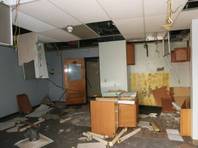Editor’s note: A good reminder that the federal government still has all the properties needed for a quick implementation of system to defend GPS. And who would have thought that folks in Las Vegas, NV would be so aware of the issue?
First wave: Is a comeback in store for Searchlight’s radio positioning station?
Sunday, Jan. 8, 2017 | 2 a.m.
At the end of an unmarked, barely passable road a few miles south of Searchlight sits a shuttered government installation. To some, it is a silent monument to a technology whose time came and went. To others, it’s symbolic of a colossally penny-wise but pound-foolish decision that put the nation’s security at risk.
The site is a former LORAN-C station — LORAN, for LOng RAnge Navigation. For more than 30 years, it broadcast a powerful, low-frequency radio beacon to help ships and planes fix their positions and find their way home.
In February of 2010, however, the Searchlight LORAN station fell silent, along with roughly two dozen similar stations throughout the country. The Obama administration figured the World War II-era technology was obsolete in an age of global-positioning satellites, and that the annual $40 million budget could be better spent.
“This system once made a lot of sense, before there were satellites to help us navigate,” Obama said in a May 2009 speech. “Now there’s GPS. And yet, year after year, this obsolete technology has continued to be funded even though it serves no governmental function and very few people are left who still actually use it.”
But the nation’s GPS system has proved vulnerable to hacking, jamming and interference from solar flares. LORAN, at least an upgraded version, is being presented as a safety net for GPS. And those behind the effort see the decision to shut down America’s LORAN sites as dangerous.
At the end of an unmarked, barely passable road a few miles south of Searchlight sits a shuttered government installation. The site is a former LORAN-C station — LORAN, for LOng RAnge Navigation. For more than 30 years, it broadcast a powerful, low-frequency radio beacon to help ships and planes fix their positions and find their way home.
“It was absolutely a mistake,” says Dana Goward, a retired Coast Guard captain. “It was a case of people at several levels of government not paying attention to the engineers and senior leaders, including four-star admirals; deliberately ignoring them to claim they had saved the government money when, in fact, they were endangering the nation.”


